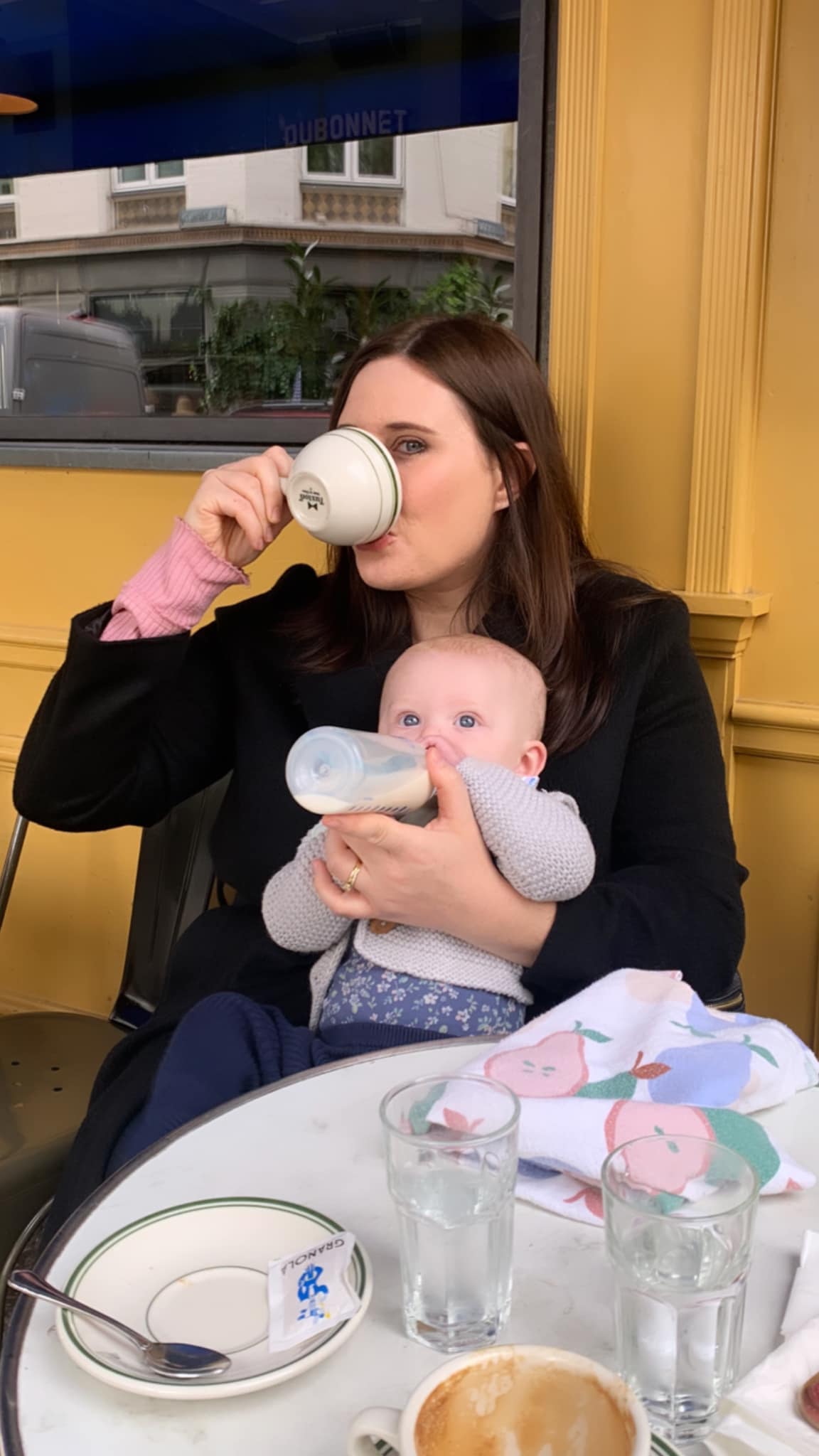“Do I look okay?” I asked my husband, seeking confirmation that buying this red dress was the right choice. “I feel like my boobs are hanging out.”
He reassured me I looked beautiful as he helped me pin together the gaping front of my new silk wrap dress—a mini splurge I bought for our first photoshoot as a family of three. (I don’t count the newborn one, since I was half-asleep and delirious, four days after our daughter was born.) I loved this dress: a vibrant, red hue that paired well with my blue eyes, and a flattering shape for my postpartum body. At six months post-birth, I had started to lose some weight, but still two sizes up from my pre-baby wardrobe, and my breasts, a full cup size larger.
As I was fidgeting with my earrings and making funny faces at my daughter, the photographer arrived. She had asked to come by our Airbnb first and then we would walk around Copenhagen, my husband’s home city we were visiting. I briefly worried about the mess as she made her way up the walk-up, but quickly forgot about it when I opened the door and was greeted by a big smile.
As a mom-of-two, I think she could sense my anxiety and perhaps my discomfort, worried about how the photoshoot would go with an unpredictable infant and still feeling less-than-confident in my new body.
“You look wonderful! What a great color! And what a cutie!” she quipped. Starting to feel relaxed, I sought her reassurance about my chest area—still nervous I was going to spill over and turn our family-friendly photoshoot into an R-rated teaser.
“Oh, I see. I remember those days. Breastfeeding can make you feel absolutely huge. But don’t worry, you look great and covered. And if you need to take a break while we’re shooting to feed her or pump, let me know,” she said as she gently patted my shoulder and moved on to inspect my husband’s attire.
She didn’t know it, but instantly, my heart sank. See here’s the thing: I didn’t—or rather, couldn’t—breastfeed and comments like these feel like a knife.
I could feel the tears welling up in my throat and eyes, and I willed them away so I wouldn’t ruin my makeup. She meant well, of course. She was trying to be kind and supportive.
Logically, I knew all of this—but it was, yet another—well-intentioned assumption about breastfeeding—that absolutely crushed me. She wasn’t the first or the last, and even as my daughter approaches her second birthday, the comments continue to plague me.
Like, the new friend who loved the plunging neckline of a dress I wore to a friend’s wedding: “OMG, look at those milk-filled boobs! Isn’t it amazing how big they get? It’s so sexy.”
Or the grandmother in the check-out line at TJ Maxx who loudly shouts over my daughter’s hysterical crying fit that I should just ‘put her on the boob’ since that always ‘worked for her kids.’
Or the seamstress making conversation while helping me get fitted for a brand-new suit I planned to wear on my first post-baby work trip, who praised me on ‘losing the baby weight’ and said, “I bet breastfeeding helped you drop the pounds so fast. It’s amazing, isn’t it?”
Or, the dear and lovely friend, sharing a cocktail on a rare mom’s night out, talking about my hopes for a second child one day, who casually said, “You sure you don’t want to at least try breastfeeding again? Every postpartum experience is different. It could be easier this time.”
Generally speaking, I wish we’d all stop commenting on a woman’s—and a mother’s—body. Hard stop.
But I also wish we’d stop making assumptions about breastfeeding.
For me, and for many mothers, it’s an emotionally loaded conversation full of fear of judgment, feelings of failure, and the end of a dream.
After all, my plan was to breastfeed my daughter.
Like many first-time mother’s, I envisioned the act of feeding my child would be natural and easy. During the last few weeks of my pregnancy, I would bounce on the ball, longingly looking at our screened-in porch, envisioning the sweet mornings I’d share nursing my little girl out there.
Snuggled up in blankets, as the spring warmed up the North Carolina air, I could see myself feeding her with my body, the one that carried her, looking at her tiny face, kissing her hands. I thought of the breeze of which I’d be able to travel—as the grandmother said, I could breastfeed her anywhere—giving us freedom to go where we please and not worry about having enough formula or a place to heat it up to the perfect temperature. I thought of cradling her in my arms, laying on our bed as she fell asleep in a milk-drunk slumber, hearing the sweet rhythm of her breathing.
The reality was far removed from my well-laid fantasy: my daughter arrived on the planet on her due date after a 52-hour labor and delivery, including an hour of pushing. She was born with a lip and a tongue tie, preventing her from getting a good latch. My milk, seemingly, never came in—at least in the way described by so many other mothers. Even with power pumping and doing every trick I could find from Google or the recommendations of friends, I would barely produce a couple of ounces.
Lactation consultants tried to offer solutions and positions, we had her ties released, and I pumped around the clock… but nothing worked.
On top of the logistical nightmare was the overwhelming anxiety that paralyzed and defined my early motherhood experience. Our pediatrician was concerned with her weight loss—leaving me feeling like a terrible mom. Our doula gently suggested supplementing with formula to help while we navigated breastfeeding, and it felt like I didn’t live up to my expectations. I wasn’t sleeping (yes, even when she slept), making every hour of every very-long day feel that much more challenging.
I would watch my husband feed our child my pumped breast milk while pumping for her next feed, crying, longing to hold her. Feeling like I was missing out on these first few moments of her life without having a moment to bond with her.
My laser-focus on breastfeeding was clouding every other interaction with her.
Around four weeks, I was curled up on the couch with a mug of tea, silently crying. Even though her mouth was healed and I was doing everything the lactation consultant and doctors had suggested, nothing was changing. My supply was still very low, her latch insignificant. I confessed to my husband that—gasp—I didn’t want to do it anymore. I asked him if it would be okay if I only pumped until I went back to work, and then we could switch to full-time formula feeding.
He held me and said, “There isn’t enough breast milk in the world to replace a happy mom. You can stop right now.”
And with that, a flood of relief washed over me. My kind, Danish-born husband, who grew up in a culture that heavily promotes breastfeeding (albeit, they also support it), gave me permission to do the one thing I couldn’t: give up. To decide that enough was enough, that I wouldn’t, in fact, do anything to breastfeed. And that, maybe, feeding my daughter a bottle would actually help me connect with her more than resenting my breasts.
It wasn’t an easy decision—it was one that I fretted over; researched heavily (thanks, Emily Oster!), lost even more precious sleep over. I’m lucky to have a supportive partner, an accepting group of friends and a therapist who specializes in postpartum. I have—and continue to—work through a lot of these feelings of unworthiness to build confidence in my choice to be a formula mom.
Now, as I begin to think about having our second (and last) child, being able to declare from the beginning that I will choose formula gives me peace. It lowers my anxiety level. It gives me a sliver of control that much of parenting doesn’t allow. It reminds me that prioritizing my mental health made me a better mom to my healthy, vibrant, beautiful toddler.
It reminds me that my ability to be a loving mother isn’t defined by the ounces of milk my boobs can or cannot produce.
The only pause I ever have is when a stranger (or even a friend) makes a comment about breastfeeding. There is no one way to feed a child—much like there is no one path to raising one. Every parent, every mother, every family, has a different journey with challenges unique to their experience. So many are harboring guilt and anxiety, stress and fear. Unsolicited assumptions don’t benefit anyone—and at worse, can make an already exhausted mom feel that much worse.
I’m thrilled for women who can and want to and work (so!) hard to breastfeed their babies. I celebrate their milestones and I honor their choices. In return, I want the same respect as a formula mom.
In the end, my daughter didn’t breastfeed more than a handful of times. But after she turned one-month old and I packed away the breast pump, we developed our own little morning routine that we’ve continued ever since. I have my coffee, she had her bottle, and now her cup of milk.
We put on our robes (or as she calls it, ‘ro-ro’) and our slippers. We pick out what she’ll have for breakfast, and we sit together, no phones, no distractions, and we talk about the day ahead. She babbles in toddler language and I sing to her, and together, the mornings are every bit as special as I dreamt of when I was pregnant.
I’m her favorite person, she’s my favorite girl, and breastfeeding didn’t bond us. My love for her did.
Author
-
Lindsay Tigar is the co-founder of Mila & Jo Media, an award-winning journalist, two-time entrepreneur and mama to Josefine. She's also a parental leave certified executive coach. She's a frequent-flier, Peloton addict, and a coffee and champagne snob. Her friends are her family and her lifeline. Lindsay calls Asheville, NC home but spends much time in Denmark, her husband's home country. Follow Lindsay on Instagram. and visit her website.




